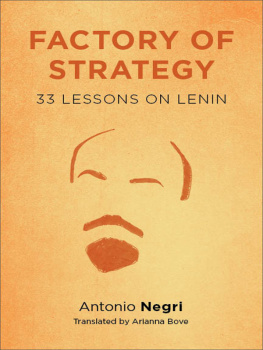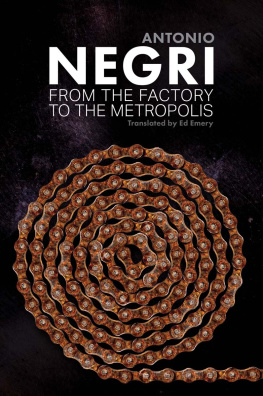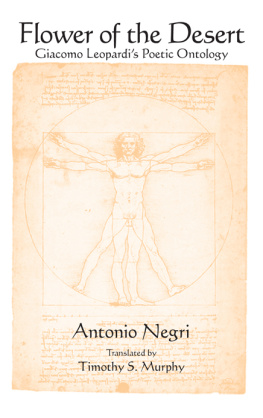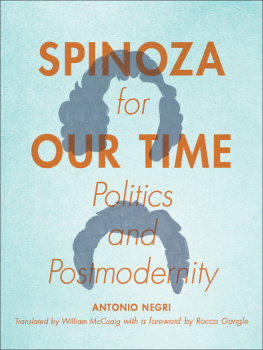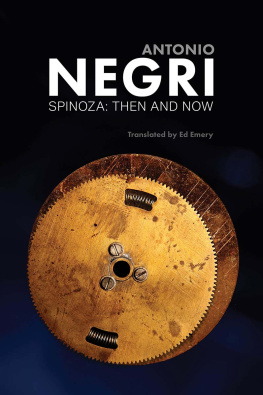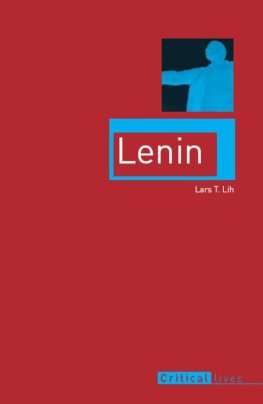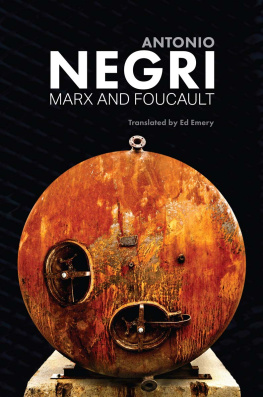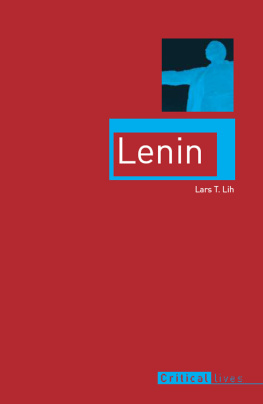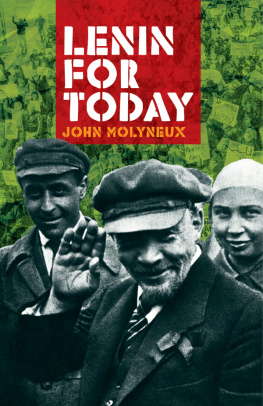FACTORY OF STRATEGY
INSURRECTIONS
Critical Studies in Religion, Politics, and Culture
INSURRECTIONS
Critical Studies in Religion, Politics, and Culture
Slavoj iek, Clayton Crockett, Creston Davis, Jeffrey W. Robbins, Editors
The intersection of religion, politics, and culture is one of the most discussed areas in theory today. It also has the deepest and most wide-ranging impact on the world. Insurrections: Critical Studies in Religion, Politics, and Culture will bring the tools of philosophy and critical theory to the political implications of the religious turn. The series will address a range of religious traditions and political viewpoints in the United States, Europe, and other parts of the world. Without advocating any specific religious or theological stance, the series aims nonetheless to be faithful to the radical emancipatory potential of religion.
After the Death of God, John D. Caputo and Gianni Vattimo, edited byJeffrey W. Robbins
The Politics of Postsecular Religion: Mourning Secular Futures, Ananda Abeysekara
Nietzsche and Levinas: After the Death of a Certain God, edited by Jill Stauffer and Bettina Bergo
Strange Wonder: The Closure of Metaphysics and the Opening of Awe, Mary-Jane Rubenstein
Religion and the Specter of the West: Sikhism, India, Postcoloniality, and the Politics of Translation, Arvind Mandair
Plasticity at the Dusk of Writing: Dialectic, Destruction, Deconstruction, Catherine Malabou
Anatheism: Returning to God After God, Richard Kearney
Rage and Time: A Psychopolitical Investigation, Peter Sloterdijk
Radical Political Theology: Religion and Politics After Liberalism, Clayton Crockett
Radical Democracy and Political Theology, Jeffrey W. Robbins
Hegel and the Infinite: Religion, Politics, and Dialectic, edited by Slavoj iek, Clayton Crockett, and Creston Davis
What Does a Jew Want? On Binationalism and Other Specters, Udi Aloni
A Radical Philosophy of Saint Paul, Stanislas Breton, edited by Ward Blanton, translated by Joseph N. Ballan
Hermeneutic Communism: From Heidegger to Marx, Gianni Vattimo and Santiago Zabala
Deleuze Beyond Badiou: Ontology, Multiplicity, and Event, Clayton Crockett
Self and Emotional Life: Philosophy, Psychoanalysis, and Neuroscience, Adrian Johnston and Catherine Malabou
The Incident at Antioch: A Tragedy in Three Acts / LIncident dAntioche: Tragdie en trois actes, Alain Badiou, translated by Susan Spitzer
Philosophical Temperaments: From Plato to Foucault, Peter Sloterdijk
To Carl Schmitt: Letters and Reflections, Jacob Taubes, translated by Keith Tribe
Encountering Religion: Responsibility and Criticism After Secularism, Tyler Roberts
Spinoza for Our Time: Politics and Postmodernity, Antonio Negri, translated by William McCuaig
ANTONIO NEGRI
FACTORY
of
STRATEGY
Thirty-Three Lessons on Lenin
Translated by Arianna Bove
Columbia University Press / New York
Columbia University Press
Publishers Since 1893
New York Chichester, West Sussex
cup.columbia.edu
Copyright 2004 manifestolibri
English translation copyright 2014 Columbia University Press
All rights reserved
E-ISBN 978-0-231-51942-7
Library of Congress Cataloging-in-Publication Data
Negri, Antonio, 1933
[Fabbrica della strategia. English]
Factory of strategy : thirty-three lessons on Lenin / Antonio Negri; translated by Arianna Bove.
pages cm (Insurrections: critical studies in religion, politics, and culture)
Translation of the authors Fabbrica della strategia.
Includes bibliographical references.
ISBN 978-0-231-14682-1 (cloth : alk. paper) ISBN 978-0-231-51942-7 (e-book)
1. CommunismSoviet UnionHistory. I. Bove, Arianna, translator. II. Title.
HX312.N3513 2014
335.43dc23
2013021200
A Columbia University Press E-book.
CUP would be pleased to hear about your reading experience with this e-book at .
JACKET DESIGN AND ART: Martin Hinze
References to websites (URLs) were accurate at the time of writing. Neither the author nor Columbia University Press is responsible for URLs that may have expired or changed since the manuscript was prepared.
CONTENTS
These lessons were first published in 1978, around thirty-five years ago. They enjoyed their own life cycle, which I tried to describe in the preface to the second edition of 1998. Why give them another life now in an English translation that will address readers of different sensibilities, readers outside Europe (which was the field of Leninism), and younger readers, who, forty years ago, were not even born and now see Lenins Soviet Russia as an archaeological remain? Will it be possible, even, to give Lenin a new life?
I would like to dedicate this book to the militants of Occupy, to the Indignados in Spain, Greece, and Europe, and to the young people who, in the Arab Spring, have opened a new cycle of anticapitalist struggles for the emancipation of labor, social equality, and common freedom. Why would they welcome such a gift? What use could it be to them? These are the questions I will try to address here. I dont know if I will succeed, but if I do, my political conscience, work, and militancy will be strengthened and maybe renewed as a result.
My starting point is a conviction, reiterated in all the volumes I coauthored with Michael Hardt (Empire, Multitude, and Commonwealth), that after 1968, through 1989, and especially during the first decade of the twenty-first century, we have embarked on a new epoch in human history; the conviction that the modernity that was definitively consolidated from the eighteenth century onward and that produced the emergence of socialist movements with capitalist development and the liberal revolution has come to its end. Capitalism, in the financial forms it takes on today and the crises it relentlessly undergoes, displays all the characteristics of its terminal stage. Occupy, the new movements of the Indignados, and the Springs seem to point to the other side of the expression of this crisis and radically manifest a new mode of thinking and acting for the emancipation of the oppressed. A Paris Commune: the novelty imagined by contemporary movements is a political form, finally discovered, that realizes the economic emancipation of labor, a new form of common life that is fundamentally expansive, a new season of critique of work and domination, and a spring of democratic invention.
However, on these premises, we do not forget Lenin or Robespierre. And we keep condemning Stalin as we condemn Napoleon. We dont forget Bolivar as we dont forget Jeffersonthough we condemn many of the consequences of their actions. Having said that, this is old news, and we insist on that. Its over, finished. But what has finished, really? Whats finished is the way these people, to impose their ideas and build a desirable society, experienced the state. They imagined and made use of the state as a necessary and fundamental tool of political activity. Here, instead, we find a place of radical discontinuity, of the very inversion of thought and political affects that we describe when speaking of this rupture with modernity; and this prevents us from seeing ourselves as disciples of any one of these heroes of modernity. We no longer believe that the state can be a motor of emancipation. Instead, we believe that the state is a sad and corrupt machine, and ontologically so, one that must definitively think of itself as an ill-fated abortion, a desire that never came to fruition because the commitment to unify democracy and capitalism, freedom and sovereignty could never be actualized. Today, we are aware of the crisis and the dissolution not only of the nation-state but also of sovereignty, and of the autonomy of the political, of that body of the King that from up in the heavens made power so sacred. We know that Jefferson, Robespierre, Bolivar, and Lenin too often hated that figure of power; but they always used it, they were always part of it.

